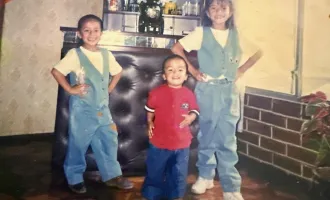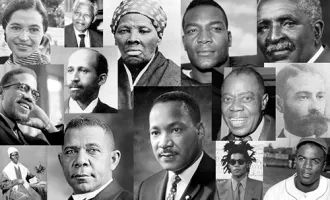
This Date in UCSF History: Remembering Martin Luther King, Jr.
Originally published in Synapse on January 14, 1993.
Martin Luther King, Jr., like his forerunner, Mohandas K. Gandhi, recognized that nonviolence need not imply submission, but could be a powerful instrument for social change. King emerged in the 1960s as the apostle of militant nonviolence in America.
He was militant in the sense that he never wavered in his resolve to see his dream come true; he used non-violent action to aggressively attack the system that perpetuated racism and prejudice. King’s life exemplified the fight for civil rights and equality for all peoples.
King advanced the movement by leading marches, rallies, and voter registration drives; going to jail for civil disobedience; giving press conferences, delivering public speeches and publishing articles and books espousing equality.
Martin Luther King, Jr.’s most enduring words were delivered August 28, 1963, to hundreds of thousands of Americans who had come to Washington to demand civil rights legislation and enforcement. The enactment of the Civil Rights Act of 1964 and the Voting Rights Act of 1965 showed the power of nonviolent direct action.
Most of us have heard little more than a few sound bites and brief quotes from the speech, thereby missing the impact and the overall importance of the message.
In light of the recent violence spawned by racial division and unequal opportunity, we would all do well to reconsider Dr. King’s text:
“Fivescore years ago, a great American, in whose symbolic shadow we stand today, signed the Emancipation Proclamation. This momentous decree came as a great beacon light of hope to millions of Negro slaves who had been seared in the flames of withering injustice.
It came as a joyous daybreak to end the long night of their captivity.
But 100 years later, the Negro still is not free; 100 years later, the life of the Negro is still sadly crippled by the manacles of segregation and the chains of discrimination; 100 years later, the Negro lives on a lonely island of poverty in the midst of a vast ocean of material prosperity. So we’ve come here today to dramatize a shameful condition.
In a sense we’ve come to our nation’s capital to cash a check. When the architects of our republic wrote the magnificent words of the Constitution and the Declaration of Independence, they were signing a promissory note to which every American was to fall heir.
This note was the promise that all men, yes, black men as well as white men, would be guaranteed the unalienable rights of life, liberty, and the pursuit of happiness. It is obvious today that America has defaulted on this promissory note in so far as her citizens of color are concerned.
Instead of honoring this sacred obligation, America has given the Negro people a bad check; a check which has come back marked ‘insufficient funds.’
We refuse to believe that there are insufficient funds in the great vaults of opportunity of this nation. And so we’ve come to cash this check, a check that will give us upon demand the riches of freedom and the security of justice.
Nineteen sixty-three is not an end, but a beginning. And those who hope that the Negro needed to blow off steam and will now be content, will have a rude awakening if the nation returns to business as usual.
There will be neither rest nor tranquility in America until the Negro is granted his citizenship rights. The whirlwinds of revolt will continue to shake the foundations of our nation until the bright day of justice emerges.
But there is something that I must say to my people who stand on the warm threshold which leads into the palace of justice. In the process of gaining our rightful place we must not be guilty of wrongful deeds.
Let us not seek to satisfy our thirst for freedom by drinking from the cup of bitterness and hatred. We must forever conduct our struggle on the high plane of dignity and discipline. We must not allow our creative protest to degenerate into physical violence.
Again and again we must rise to the majestic heights of meeting physical force with soul force. The marvelous new militancy which has engulfed the Negro community must not lead us to a distrust of all white people, for many of our white brothers, as evidenced by their presence here today, have come to realize that their destiny is tied up with our destiny and they have come to realize that their freedom is inextricably bound to our freedom.
This offense we share mounted to storm the battlements of injustice must be carried forth by a biracial army. We cannot walk alone. And as we walk, we must make the pledge that we shall always march ahead. We cannot turn back. There are those who are asking the devotees of civil rights, ‘When will you be satisfied?’
We can never be satisfied as long as the Negro is the victim of the unspeakable honors of police brutality. We can never be satisfied as long as our bodies, heavy with fatigue of travel, cannot gain lodging in the motels of the highways and the hotels of the cities. We cannot be satisfied as long as the Negro’s basic mobility is from a smaller ghetto to a larger one.
We can never be satisfied as long as our children are stripped of their selfhood and robbed of their dignity by signs stating ‘for whites only.’
We cannot be satisfied as long as a Negro in Mississippi cannot vote and a Negro in New York believes he has nothing for which to vote. No, we are not satisfied, and we will not be satisfied until justice rolls down like waters and righteousness like a mighty stream. I am not unmindful that some of you come here out of excessive trials and tribulation.
Some of you have come fresh from narrow jail cells. Some of you have come from areas where your quest for freedom left you battered by the storms of persecution and staggered by the winds of police brutality.
You have been the veterans of creative suffering. Continue to work with the faith that unearned suffering is redemptive. Go back to Mississippi; go back to Alabama; go back to South Carolina; go back to Georgia; go back to Louisiana; go back to the slums and ghettos of the northern cities, knowing that somehow this situation can, and will be changed.
I have a dream that one day on the red hills of Georgia, sons of former slaves and sons of former slave-owners will be able to sit down together at the table of brotherhood. I have a dream that one day, even the state of Mississippi, sweltering with the heat of injustice, sweltering with the heat of oppression, will be transformed into an oasis of freedom and justice.
I have a dream my four little children will one day live in a nation where they will not be judged by the color of their skin but by the content of their character.
I have a dream today!
I have a dream that one day, down in Alabama, with its vicious racists, with its governor having his lips dripping with the words of interposition and nullification, that one day, right there in Alabama, little black boys and black girls will be able to join hands with little white boys and white girls as sisters and brothers.
I have a dream today! I have a dream that one day every valley shall be exalted, every hill and mountain shall be made low, the rough places shall be made plain, and the crooked places shall be made straight and the glory of the Lord will be revealed and all flesh shall see it together.
This is our hope. This is the faith that I go back to the South with.
With this faith we will be able to hew out of the mountain of despair a stone of hope.
With this faith we will be able to transform the jangling discords of our nation into a beautiful symphony of brotherhood.
With this faith we will be able to work together, to pray together, to struggle together, to go to jail together, to stand up for freedom together, knowing that we will be free one day.
This will be the day when all of God’s children will be able to sing with new meaning — my country ‘tis of thee; sweet land of liberty; of thee I sing; land where my fathers died, land of the pilgrim’s pride; from every mountain side, let freedom ring — and if America is to be a great nation, this must become true.
So let freedom ring from the prodigious hilltops of New Hampshire. Let freedom ring from the mighty mountains of New York. Let freedom ring from the heightening Alleghenies of Pennsylvania. Let freedom ring from the snow-capped Rockies of Colorado.
Let freedom ring from the curvaceous slopes of California. But not only that. Let freedom ring from Stone Mountain of Georgia.
Let freedom ring from Lookout Mountain of Tennessee. Let freedom ring from every hill and molehill of Mississippi, from every mountainside, let freedom ring.
And when we allow freedom to ring, when we let it ring from every village and hamlet, from every state and city, we will be able to speed up that day when all of God’s children — black men and white men, Jews and Gentiles, Catholics and Protestants — will be able to join hands and to sing in the words of the old Negro spiritual, ‘Free at last, free at last; thank God Almighty, we are free at last.’”



